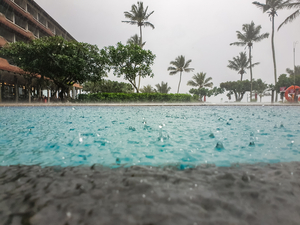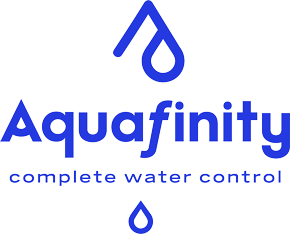
Heaven knows we need the rain, and it’s great for our lawns, forests, and even for Lake Okeechobee, but what does it do to your pool?
Here are some tips to protect yourself from the “Big 5” rain issues.

#1 Stabilizer: Rain can quickly dilute the stabilizer and increase your chemical consumption by 30-50%. Take a test kit reading and make an immediate correction to protect your budget. We recommend the CES powdered stabilizer as it dissolves instantly.
#2 Water Balance: Rain is low in calcium and alkalinity, and will seriously affect your water balance and turn the pool water aggressive. Take a test kit reading and adjust chemicals to bring your pool back in balance. You will need to add the correct amounts of calcium chloride and bicarb unless you are using Pulsar briquettes.
#3 Salt: For many of you who are using salt chlorination, rain will quickly dilute your salt level, reduce your chlorinator output, and could damage your cell. Test salinity and add 1-2 bags for every 1” of rain, or if you have one of our systems, just fill your CES Salt tank with a few bags.
#4 Algae: Rain can sometimes bring thousands of algae spores into your pool. Coupled with low chlorine levels, you could experience an ugly bloom that is somtimes difficult to get rid of. Make sure you have plenty of chlorine in your tank or feeder, and have your system serviced if it has a difficult time keeping up.
#5 Water Level: If the weatherman predicts 5″ of rain, you’ll soon need to get rid of 5″ of pool water. Why? High water level makes the gutters go “dead,” so dirt and leaves will sink to the pool floor and you’llspend a lot more time vacuuming – that is unless you have an Enduro robotic vacuum. Dump excess water as soon as possible to get your “self cleaning” pool working as designed.
Your wall-mounted CES Pool Water Dosing Calculator will help you make quick decisions with dosing. Let us know if yours is missing, and we will forward a copy via email.
There are about 600 gallons in each (one) inch of your pool for every 1,000 square feet of surface area, but as you can see…it can have a big effect on a bunch of stuff. Overall, rainwater is GOOD for your pool water as it also dilutes many of the organics that cause pool irritation and corrosion, but sometimes it just serves to keep us on our toes.
Please let us know if we can assist you in any way.

